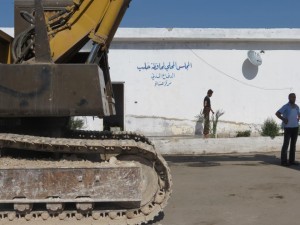Aleppo’s City Council Has Great Ambitions, Little Capacity

Lina al-Hakim*
(Aleppo, Syria) – With basic services stopped in most areas of rebel-controlled Aleppo, a local City Council was elected in early March 2013 in an effort to find practical solutions to the problems facing the residents of the city. The Council’s goal was to collaborate with Aleppo’s “Neighbourhood Assemblies,” local opposition bodies that represent residential areas no longer served by the government institutions in Damascus.

The Aleppo’s City Council is composed of 29 members. Most of the council members are Islamists, and all of them are men. They were elected in the Turkish city of Gaziantep, about 120 kilometres from the city of Aleppo. 224 voting delegates participated, crossing the border to vote in this democratic experiment.
The Aleppo City Council began its tenure with a campaign called “Keep It Clean,” a trash clean-up campaign aimed at cleaning the streets in areas where regular trash trash-pick up ceased months ago.
Various groups combed the city collecting garbage and spraying pesticides in an effort to curb a recent outbreak of Leishmaniasis, also known as “Aleppo boil”, a parasitic disease that is spread by sand flies and has recently become increasingly common. The Council also spearheaded a measles vaccination campaign for children between the ages of six months and two years.
The City Council’s Health Office supports medical outposts throughout the city to provide essential primary care and to support ten hospitals that are still operational. The health office is also establishing specialized clinics in such fields such as obstetrics, gynaecology and specialized surgery.
Despite the Council’s best effort, “the health situation is very unstable,” says Dia Abdullah, who works in the Council’s information office. Abdullah blamed the condition of the city’s health sector on the lack of resources, including a significant shortage of competent staff and poor infrastructure.
Abdullah spoke of multiple city council programs covering all aspects of public service, from health and education, to relief and media. Abdullah insisted the council is serious about its work, although he admitted the programs are “ambitious” and the council’s capacity is weak.
For example, the council is currently preparing a study on the state of the electrical grid to determine the extent of the damage and if it will be possible to rehabilitate the network. The Neighbourhood Assemblies are still responsible for repairing every day breakdowns.
Council members say they plan to invest in existing neighbourhood water wells in case of prolonged outages by securing generators to draw water, as well as filters to ensure the water is safe to drink.
Meanwhile, the Neighbourhood Assemblies are currently establishing a unified database for all relief agencies and bodies.
Regarding education, the council has announced that preparatory and high school exams will be held in August following the Eid al Fitr holiday.
“These [diplomas] will be recognized by the forthcoming interim government based on a spoken agreement which will be put in writing soon,” said to Abdul Karim Anis, an official from the Council’s Office of Education and Culture.
The Education office announced it will hold preparation courses for high school exams at its scientific and literary branches. These classes will be offered free of charge to enable the greatest number of students to sit for the exams. The office even posted to the council’s Facebook page that it was searching for licensed teachers and professionals with experience to work as paid teachers in these intensive courses.
It is noteworthy that the courses will follow the same curriculum as the Syrian government, with the only difference being that any references to the Syrian regime or the ruling Baath Party will be omitted, especially from the history section. To modify the entire curriculum would require “many specialists and a lot of time,” said Anis.
The Damascus Bureau took to the streets to see how average citizens viewed the city council’s progress.
Arif, 25, a university graduate from Al Kalassa said: “until now, the citizens have seen nothing from the council. Its decisions are still ink on paper, with the exception of some of the clean-up and electricity initiatives.”
Gaith, 27, from Ansari, said that so far, the council has only succeeded in implementing a clean-up campaign, spraying pesticides and distributing some food baskets.
“They promised us they would secure homes for some of those [who lost theirs], and said they are available, but we are still waiting,” he complained, but added that he approves of how the council is coordinating with the Neighbourhood Assemblies, which seems promising to him.
Souad, 40, a housewife from Bustan Al-Qasr, said she was “pleased” students would have the opportunity to sit for exams.
“I have a son in high school who has not had the chance to sit for his exams officially, so I was very happy with this resolution,” she said.
Despite a high level of optimism among those interviewed, many wondered whether the council’s achievements have had any real impact on the ground. The council justifies its track record, pointing to a lack of financial support and insufficient time to achieve its goals, having been formed just two months ago. Elections are scheduled to be held every six months, giving the current council just three more months to fulfil their agenda.
*Lina al-Hakim is a pseudonym for a journalist living in Syria. Other names have been changed or omitted from this article in order to protect the speakers.
